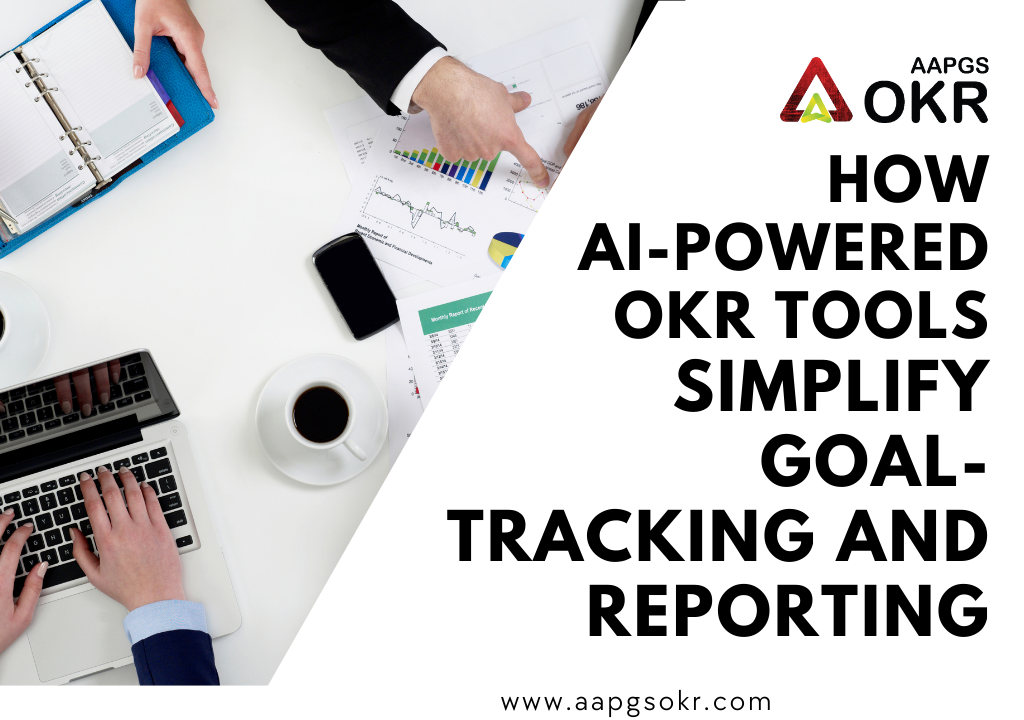Organizations must have an adaptive system in place to monitor performance, track progress, and change strategies for guaranteed success. Here comes Artificial Intelligence powered OKR tools to the rescue intelligent, effective solutions that make goal-tracking and reporting automatic and seamless.
AI-driven OKR platforms provide businesses with advanced tools to enhance performance management, foster team alignment, and ensure continuous growth. By integrating artificial intelligence into your goal-tracking system, your business can unlock new levels of efficiency, accuracy, and actionable insights.
The Role of AI in OKR Management
AI in OKR software is a key factor in enabling companies to revolutionize old ways of goal-setting and performance monitoring. Compared to manual operations, AI enables many of the processes involved in OKR management, such as tracking progress, recognizing potential hindrances, and giving real-time insights into team performance.
AI Automation for Real-Time Goal Monitoring
- Among the key advantages of AI-driven OKR tools is the possibility to automate tracking goals.
- Through the use of AI, the tools can track progress by the teams in real time, adjust goals dynamically, and give managers an always-updated picture of the extent to which objectives are being achieved.
- Ongoing, real-time monitoring cancels manual data input and assures teams they have a clear sense of where they are at.
Data-Driven Reporting and Insights
- AI in OKR software not only monitors progress it also evaluates data to produce valuable reports.
- Through the processing of large amounts of performance data, AI-driven platforms can pinpoint trends, identify potential obstacles, and predict future results.
- Such insights inform managers and decision-makers with the information they require to improve strategies and obtain improved results.
Personalizable Dashboards for Improved Visualization
- OKR software based on AI generally includes adjustable dashboards that enable companies to design the layout and appearance of their key performance indicators.
- The dashboards provide unambiguous, aesthetically pleasing displays of advancement toward goals, making it simple for team members and stakeholders to evaluate performance.
- The fact that dashboards can be adjusted ensures that teams have the ability to concentrate on metrics that are most important to them, whether it is sales quotas, project deadlines, or customer satisfaction.
Effective Goal Setting and Alignment
- AI-based OKR software also streamlines the goal-setting process by suggesting objectives depending on historical performance, existing trends, and business requirements.
- AI considers a number of factors such as historical performance and external market forces to make sure that the goals being established are ambitious but realistic.
- Furthermore, AI ensures that the objectives are aligned between departments, and there is a sense of team spirit and cohesion.
Improved Collaboration and Communication
- AI-based OKR software encourages improved teamwork. AI can sync updates automatically across teams, facilitating improved coordination and minimizing silos.
- AI can also send timely reminders, alerts, and notifications to keep everyone informed.
- By keeping teams aligned and concentrated on shared goals, AI software can lead to enhanced productivity and improved team collaboration.
Continuous Feedback and Adaptive Strategies
One of the biggest advantages of AI-driven OKR software is their capacity for providing ongoing feedback. As companies make their way through objectives, AI can propose live changes or improvements, which ensures strategies do not become obsolete.
- Improved Efficiency: AI takes care of most of the manual tasks of goal tracking and reporting, leaving teams with more time to work on strategy and execution.
- Intelligent Decision-Making: With AI's capacity to process large amounts of data and offer actionable insights, companies can make better decisions that lead to growth.
- Agility and Flexibility: AI-driven OKRs make companies agile, easy to adapt to changes within the market or the company itself.
- Transparency and Accountability: With automatic tracking and reporting, AI maintains transparency among all the team members about their goal progress, creating a culture of accountability.
- Alignment Across Teams: AI brings alignment among goals in different departments, improving collaboration and ensuring that everyone works towards one goal.
Goal-Tracking Redefined in AAPGS OKR
We at AAPGS know how difficult it is for companies to track and report their goals. Our OKR solution, powered by AI, aims to make the process easier with sophisticated automation, data-driven intelligence, and dashboards that can be tailored to suit your company's needs and improve its performance.
Conclusion
AI-based OKR software is becoming increasingly indispensable to contemporary business management. By making goal-tracking easy and reporting automated, companies can gain more efficiency, transparency, and alignment. AAPGS OKR is developed to enable you to make the most of such advancements, providing a state-of-the-art solution for intelligent goal management.
FAQ
- What is OKR in performance management?
In performance management, OKR stands for Objectives and Key Results. It's a framework that helps align individual and team efforts toward achieving specific, measurable goals. - What are the two parts of an OKR?
An OKR application has two core parts: Objectives and Key Results. Objectives define the broad, ambitious goal, while Key Results are the measurable milestones that indicate progress towards achieving that objective. - How many OKRs should a team have?
A team should aim for a maximum of 3-5 Objectives and Key Results per quarter. This number is a guideline to ensure focus and avoid spreading efforts too thinly. - What scope do you see for the application of artificial intelligence to the OKR system?
AI can simplify the process of setting and tracking OKRs. AI systems use algorithms, machine learning, and specialized training to analyze data, such as customer behaviors, market trends, and other important metrics for a company's performance. - How does OKR work?
OKRs work by aligning teams and individuals around a shared understanding of what matters most, focusing efforts on measurable goals, and tracking progress towards those goals.

